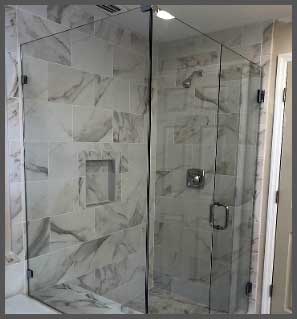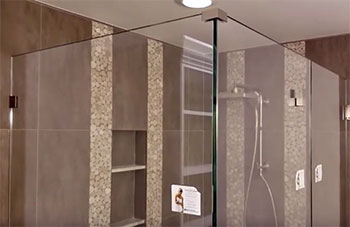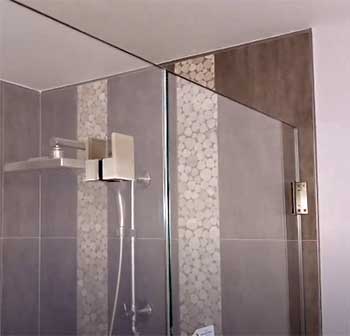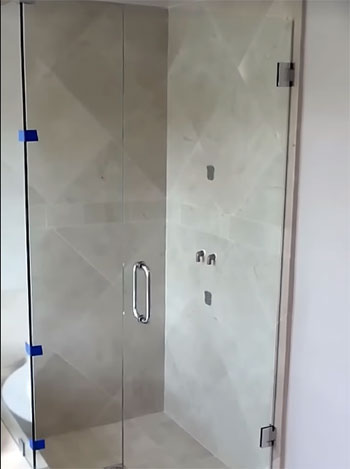Renovating a bathroom or installing a new shower door requires careful thought. One of the critical considerations is the glass thickness. The two most commonly used are 3/8″ and 1/2″ glass shower doors.
However, how do you decide which thickness is right for your space?
In this article, we’ll dive deep into the world of 3/8 and 1/2 glass shower doors, highlighting their pros and cons to make your decision-making process smoother.
A Brief Comparison Table
| Feature | 3/8″ Glass Shower Door | 1/2″ Glass Shower Door |
| Appearance and Feel | Standard look and feel | Luxurious, high-end look and feel |
| Durability and Stability | Durable and sturdy, but may feel lighter | More durable and stable due to increased thickness |
| Cost | Generally more cost-effective | More expensive due to material cost and specialized hardware |
| Installation | Easier to install but professional installation recommended | Typically requires professional installation due to weight |
| Hardware Compatibility | Accommodates standard hardware | Supports heavy, ornate hardware due to thickness |
The Glazing World of 3/8 Glass Shower Doors
3/8″ glass shower doors are considered the industry standard for most residential bathrooms. They are a common choice due to their durability and aesthetic appeal.
Pros of 3/8 Glass Shower Doors

- Durability
3/8″ glass shower doors are known for their robustness.
They can withstand high amounts of pressure and do not easily chip or break.
This quality makes them an ideal choice for households with children or pets.
- Cost-Effective
When compared to their 1/2″ counterparts, 3/8″ shower doors are relatively less expensive.
The reduced cost doesn’t compromise the quality, making them a budget-friendly choice for most homeowners.
- Versatility
With their mid-range thickness, 3/8″ glass doors provide a wide range of design options. They fit well into traditional, contemporary, or modern bathroom styles.
Cons of 3/8 Glass Shower Doors
- Lighter Feel
Although 3/8″ glass doors are strong, they can feel lighter and less substantial compared to 1/2″ doors. For some homeowners, this difference can affect the perceived quality of the shower door.
- Installation Limitations
Due to their thinner profile, 3/8″ doors may not support heavy, elaborate hardware. They can also be more challenging to install than thicker alternatives.
Delving into the Details of 1/2 Glass Shower Doors
1/2″ glass shower doors fall into the premium category. They lend an upscale look to bathrooms and offer an unmatched feel of quality and solidity.
Pros of 1/2 Glass Shower Doors
- Luxurious Appearance

One of the standout features of 1/2″ glass shower doors is their luxurious appearance. The extra thickness gives them a high-end look that can enhance the overall aesthetic of your bathroom.
- Stability
1/2″ glass doors are substantially heavier than 3/8″, providing more stability. They are less likely to wobble or vibrate when opening and closing, which some homeowners find appealing.
- Hardware Compatibility
These doors can support heavy, extravagant hardware options due to their thickness. So, if you desire opulent handles or hinges, 1/2″ glass doors could be your best bet.
Cons of 1/2 Glass Shower Doors
- Higher Cost
1/2″ glass shower doors typically come at a higher price point. The additional cost is primarily due to the material’s increased weight and the specialized hardware needed.
- Difficult Installation
Their heavy weight makes these doors challenging to install. Often, a professional installer is required to ensure they are safely and correctly fitted.
Key Differences between 3/8 and 1/2 Glass Shower Doors
Choosing between 3/8″ and 1/2″ glass shower doors may seem confusing at first glance, as they might appear similar. However, they differ in several crucial aspects that significantly impact your bathroom’s look, feel, and functionality.
Here, we take a detailed look at their key differences.
- Appearance and Feel

The thickness of the glass shower door plays a significant role in the overall aesthetic and feel of your bathroom.
A 1/2″ glass door gives a more luxurious, substantial look due to its extra thickness.
On the other hand, while the 3/8″ door is also aesthetically pleasing, it does not provide the same high-end feel as its thicker counterpart.
- Durability and Stability
While both 3/8″ and 1/2″ glass shower doors are durable, they differ in their stability. The thicker 1/2″ glass door provides more stability due to its increased weight.
It’s less likely to wobble or vibrate when opening and closing. In contrast, the 3/8″ glass door, while robust and sturdy, may not feel as solid due to its reduced weight.
- Cost
Cost is another critical difference between 3/8″ and 1/2″ glass shower doors. Typically, the thicker the glass, the higher the cost. As such, 1/2″ glass doors come at a higher price point compared to 3/8″ doors due to the increased material cost and the specialized hardware needed to support the extra weight.
- Installation
The installation process for these two types of doors also differs significantly. The 1/2″ glass shower doors are heavier and usually require professional installation. In contrast, 3/8″ doors, being lighter, are easier to install, although professional installation is still recommended to ensure a secure fit.
- Noise Reduction
The thickness of the glass also impacts noise transmission. Going with a 1/2 inch door instead of 3/8 inch will provide noticeably better soundproofing.
With 3/8 inch glass, some ambient noise like music, voices, or running water can transmit through the door. It offers a moderate noise barrier.
1/2 inch glass significantly reduces noise transmission owing to the thicker tempered glass. It better insulates the shower, creating a quieter and more peaceful ambiance.
If soundproofing is important to you, choose a 1/2 inch shower door. This is especially beneficial for families with kids or if the bathroom shares a wall with common spaces like the living room.
- Safety
Safety is a crucial factor for any glass installation, especially in the bathroom. Tempered glass is a must for shower doors in any thickness to reduce the risk of injury if the glass breaks.
During the tempering process, the glass is heat-strengthened for enhanced durability and safety. When tempered glass does break, it shatters into small, rounded pieces rather than dangerous shards.
Both 3/8 and 1/2 inch glass go through tempering to meet code requirements. But the 1/2 inch thickness results in a more shatter-resistant door that is less prone to breaking from impact.
If you have small children who will be using the shower, 1/2 inch glass provides an extra level of safety and impact resistance. The rounded shape of 1/2 inch tempered shards is also safer compared to the smaller 3/8 inch shards if breakage did occur.
- Aesthetics
Beyond just function, the thickness of the glass also impacts the overall look, feel, and aesthetics of the shower door.

3/8 inch still allows clear visibility into the shower. But it has a slightly thinner appearance compared to the more bold, heavy look of a 1/2 inch door.
1/2 inch glass is crystal clear and provides a seamless, sleek look. The thicker glass conveys luxury, sophistication, and high-end elegance.
From inside the shower, 1/2 inch glass feels smoother to the touch and “disappears” more than 3/8 inch glass. This helps create a spa-like vibe.
For contemporary, modern bathrooms where aesthetics are key, 1/2 inch glass is definitely the choice that aligns with the design goals. The clean, upscale appearance matches well with contemporary styles and materials like glass tile accents and metal finishes.
But for more casual, traditional, or farmhouse bathrooms, 3/8 inch glass can provide adequate aesthetics at a more budget-friendly price point.
- Hardware Compatibility
Lastly, the type of hardware that can be used differs for these two types of shower doors. The 1/2″ doors can support heavier, more ornate hardware due to their increased thickness. Meanwhile, the 3/8″ doors may not accommodate heavy hardware due to their thinner profile.
When deciding between a 3/8″ and a 1/2″ glass shower door, these differences should be carefully considered. Your choice will ultimately depend on your aesthetic preferences, budget, and the specific needs of your bathroom.
Frequently Asked Questions (FAQ)
The difference lies in the thickness and weight of the glass. A 1/2 inch glass shower door is thicker and heavier than a 3/8 inch door, offering more stability but requiring specialized installation and support.
The thickness of a shower door largely depends on personal preference and budget. Both 3/8″ and 1/2″ are suitable for most applications. However, if a high-end, luxurious feel is desired, then a 1/2″ glass door could be more appropriate.
Yes, a 3/8″ glass is thick enough for a shower door. It’s the industry standard and is sufficiently durable and versatile for most residential bathrooms.
Typically, frameless shower doors use either 3/8″ or 1/2″ thick glass. The choice depends on the homeowner’s aesthetic preference and budget.
1/2 inch glass is generally the better choice for shower doors because it’s more durable, provides better noise insulation, has a more luxurious appearance, and is safer due to greater impact resistance. However, 3/8 inch glass is an affordable option that still functions adequately as a water barrier.
Yes, 1/2 inch glass shower doors are typically worth the additional investment. The crystal clear, seamless appearance provides a luxury look and feel that aligns with modern designs. Compared to 3/8 inch glass, the 1/2 inch thickness also better insulates against noise, is more durable, shatter-resistant and provides added safety.
Wrapping Up
In conclusion, both 3/8″ and 1/2″ glass shower doors have their merits and drawbacks. Your decision should balance functionality, aesthetics, and cost-effectiveness according to your personal preference and bathroom requirements.
By understanding the pros and cons of each option, you can select the glass thickness that will create the perfect bathroom sanctuary, embodying your style and suiting your everyday needs.
